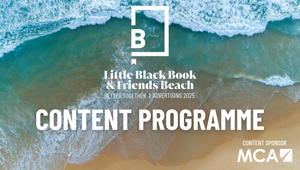
Branded Entertainment Is Shaping the Future of Advertising

Though LBB doesn’t have the data to prove this, we reckon that the ‘skip’ button must be one of the most often hit (touched?) ones by people interacting with ads online. Then there are the ads consumers are actively seeking out and engaging with – the stuff brand dreams are made of.
“Branded entertainment sits right at the crossroads of marketing and storytelling. Instead of interrupting people’s lives with traditional ads, brands are now producing content that viewers actively choose to engage with. Stuff they genuinely enjoy watching. This trend isn’t just reshaping advertising; it’s changing the way agencies and production companies create, collaborate, and measure success,” says Stefan Kerridge, strategy director at the global production specialist MCA. Combining strategic consulting, production expertise, data-driven insights, and global execution, MCA delivers marketing content at maximum value and it has been privy and instrumental to many of the industry’s changes, including the shift to branded entertainment.
A notable shift
A big driver of this shift, according to Stefan, is the growing decline in effectiveness of traditional ads. “People skip, block, or simply ignore intrusive commercials. Advertising effectiveness expert Peter Field has noted that creatively-awarded ads today have become less impactful than at any point in the last 24 years, eroding the traditional advantage they once had.”
He likewise notes that Sir John Hegarty pointed to the importance of storytelling and entertainment, commenting at the BCMA awards, “Most content goes straight to digital landfill. We'd like to seek out the work that captures our imagination. Without entertainment, there is no engagement.”
But some brands are bucking the trend. A report by Tracksuit and Small World released last week – aptly titled Entertain or Die 2.0 – found that the key to growth in today’s market is putting entertainment at the centre of brand marketing strategy as demonstrated by Duolingo, Liquid Death, and Rhode. The report shows that brands prioritising entertainment are thriving, backed by insights from 20,000 respondents and social media data.
Interestingly, branded storytelling isn’t exactly new. In media years, it’s pretty old and dates back to the '30s and '40s. “Procter & Gamble sponsored serialised radio dramas aimed at homemakers, hence the term ‘soap operas’. But the modern wave really took off in the early 2000s. BMW’s landmark short film series ‘The Hire’ (2001) set a new standard. Millions tuned in voluntarily, boosting BMW’s sales without ever feeling like they were watching an ad,” Stefan says.
What's fuelling the transition towards a preference for branded entertainment? People see more ads today than ever before so it’s not surprising that they’re tired of being sold to in the traditional manner. The report states that “the price to reach a customer has risen by 222%,” qualifying that in the attention economy, a brand’s competition “is as much Mr Beast as Mars or Microsoft.”
Audience-first strategy
“The lines between straight advertising and branded entertainment are also blurring,” Stefan adds. “The recent UK Santander Ant & Dec series feels closer to mini TV sketches than conventional ads. They're crafted primarily to engage viewers through humour and relatable scenarios, with the bank's messaging woven in subtly. Audiences watch because it’s genuinely enjoyable content, not just because it’s an ad. Unlike one-off ads, this campaign has longevity. Each new ‘episode’ or advert builds upon previous ones, maintaining consistent themes and character portrayals that viewers can look forward to. It's this continuity that differentiates branded entertainment from traditional short-lived ad campaigns.”
One of MCA’s longest-serving clients, Cadbury, has a rich history of integrating branded entertainment into its marketing strategies, crafting campaigns that don't just showcase products but also engage audiences deeply through storytelling and interactive experiences. In 2019, the brand produced a content series called 'Families Reunited' to promote its Heroes boxed chocolates which captured parents reconnecting with their teenage children by engaging with their interests and hobbies.

Just last week, London saw the premiere of ‘Reef Builders’ presented by Sheba (which is now available to stream on Prime Video), a new documentary directed and produced by Stephen Shearman, with actor and environmental advocate Auli’i Cravalho by AMV Stream, developed in partnership with sister company AMV BBDO and support from MCA. It spotlights the inspiring stories of the people behind the Sheba Hope Grows programme – part of one of the world’s largest coral reef restoration programmes led by Mars Sustainable Solutions (MSS).
“At MCA, we're increasingly supporting clients as they explore these creative opportunities beyond traditional advertising, developing adaptable production strategies tailored to their unique goals. IKEA, another longstanding advocate of branded entertainment, recently enlisted our help to produce eighteen two-minute films, spotlighting the everyday lives of people and highlighting how IKEA products play a meaningful, practical role. Filmed using agile production techniques, these docu-style shorts were successfully showcased both in-store and across social media platforms,” he adds.
The industry’s top awards are rewarding entertainment-first campaigns too like 2024’s powerful ‘We Are Ayenda’ campaign from Whatsapp, which won a Grand Prix Lion in 2024. The documentary tells the story of the Afghan Girls National Football Team's courageous escape from Afghanistan during the Taliban takeover in 2021, emphasising how the team utilised WhatsApp’s encrypted messaging to coordinate their evacuation safely. Additionally, the Effie Awards recorgnised both Cadillac’s ‘EV Your Life’ and Coca-Cola’s ‘Rewriting the Christmas Playbook’ for branded entertainment's ability to resonate deeply and drive impactful results.
Stefan adds: “Streaming, ad blockers, and the endless scroll of mobile screens mean brands have had to become more creative. Great stories naturally engage attention, making storytelling an obvious solution.”
Some brands are leading the way in employing and deploying branded entertainment strategies. Stefan highlights Red Bull in particular: “It has almost become a media company in itself, producing documentaries and events like the thrilling ‘Art of Flight’. Another standout is Lenovo’s ‘Late Night I.T.’, a series featuring engaging conversations on technology. It positioned Lenovo as a credible voice in the industry, so much so that Bloomberg TV picked up the series for broadcast. These examples showcase how powerful authentic storytelling can be for brand credibility.”
Strategic brand advantages
Stefan is clear that brands gain several strategic advantages when they move their marketing and content strategy towards a branded entertainment model. In his view, brands benefit through:
“Deeper consumer engagement: Audiences choose to watch the content, making it more meaningful and memorable.
Emotional storytelling: Good stories naturally evoke emotions. Dove’s Real Beauty campaign didn't just sell soap—it sparked conversations about beauty standards, connecting deeply with viewers.
Long-term loyalty and affinity: Entertainment creates positive brand associations without the sales pitch, building lasting goodwill.
Flexibility and depth: Brands can explore complex values or messages that wouldn’t fit in a short commercial.
Greater shareability: People love sharing stories that inspire or entertain, amplifying reach organically.”
But brands need to have patience – pivoting to this new strategy isn’t going to bring success overnight. “Success demands great creativity, skilled production, and the right talent to deliver genuinely compelling content,” Stefan says.
“Often, the primary challenge brands face is managing siloed agency partners, each specialising in different areas, resulting in multiple assets produced across varying formats and suppliers. At MCA, our global expertise, combined with localised execution, streamlines the production process, ensuring consistency and efficiency across markets. Additionally, our impartial, client-first approach guides brands strategically through various creative possibilities.”
Pivoting the content strategy is the first step; executing it to a high standard is the next, essential one which brings new challenges and opportunities for production in particular. Production companies “are being asked to do more than execute a storyboard. They now often shape the idea itself, working directly with brands or collaborating closely with creative agencies from day one.
“Production companies must handle diverse formats. From short TikTok clips to full-length documentaries. This requires flexibility, longer schedules, more complex logistics, and an entirely new level of strategic input. The old model of ‘receive brief, execute brief’ is evolving into a more collaborative, iterative process. The best production companies have always been great at storytelling and bringing ideas to life, now it's about being increasingly flexible and doing this in many different ways.” explains Stefan.
With the fight for consumer attention only set to intensify, branded entertainment will become an avenue that more and more brands pursue. Stefan predicts that we can “expect more blurring of lines between entertainment, commerce, and interactivity. Brands will keep building in-house studios, crafting everything from quick social media clips to premium streaming series. Virtual reality, augmented reality, interactive storytelling, and immersive live events are on the horizon.”
How can brands prepare and get ahead of this strategic content pivot? “Success lies in creating content people genuinely choose to engage with. Agencies and production companies will thrive by embracing flexibility, agility, and creative collaboration. This isn't just a fad – it's the future of content, driven by audiences who reward meaningful, entertaining storytelling.”














